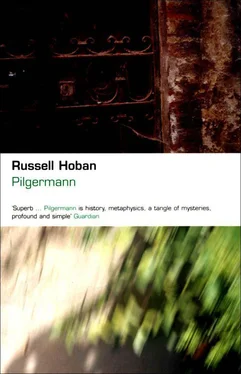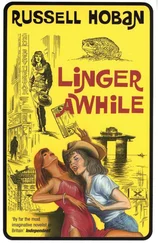Russell Hoban - Pilgermann
Здесь есть возможность читать онлайн «Russell Hoban - Pilgermann» весь текст электронной книги совершенно бесплатно (целиком полную версию без сокращений). В некоторых случаях можно слушать аудио, скачать через торрент в формате fb2 и присутствует краткое содержание. Год выпуска: 2002, Издательство: Bloomsbury Publishing PLC, Жанр: Современная проза, на английском языке. Описание произведения, (предисловие) а так же отзывы посетителей доступны на портале библиотеки ЛибКат.
- Название:Pilgermann
- Автор:
- Издательство:Bloomsbury Publishing PLC
- Жанр:
- Год:2002
- ISBN:нет данных
- Рейтинг книги:5 / 5. Голосов: 1
-
Избранное:Добавить в избранное
- Отзывы:
-
Ваша оценка:
- 100
- 1
- 2
- 3
- 4
- 5
Pilgermann: краткое содержание, описание и аннотация
Предлагаем к чтению аннотацию, описание, краткое содержание или предисловие (зависит от того, что написал сам автор книги «Pilgermann»). Если вы не нашли необходимую информацию о книге — напишите в комментариях, мы постараемся отыскать её.
Pilgermann — читать онлайн бесплатно полную книгу (весь текст) целиком
Ниже представлен текст книги, разбитый по страницам. Система сохранения места последней прочитанной страницы, позволяет с удобством читать онлайн бесплатно книгу «Pilgermann», без необходимости каждый раз заново искать на чём Вы остановились. Поставьте закладку, и сможете в любой момент перейти на страницу, на которой закончили чтение.
Интервал:
Закладка:
Bohemond does not wait for the Turks to come to Antioch; he leaves the foot-soldiers and the horseless cavalry to defend the camp against further sorties and with that cavalry numberless in arrogance but many times outnumbered by the enemy he moves out to take up a position between the Orontes and the Lake of Antioch where he cannot be encircled. Needs must when the devil drives, and he has learned by now that the harrying, stinging, in-and-out, encircling tactics of the Turks must be met with equal cunning if he is to beat them. And of course he does. On first sight of the Turks the Franks charge before the Turkish archers can be effectively disposed, then they withdraw, luring the Turks into that space between the lake and the river, that space chosen for the battle. Here the Frankish cavalry do again what they do better than anyone else, the straight charge with lance in rest. So again the relieving army is put to flight by Bohemond, by that unturning battle-greed of his. So ardent is he in his pursuit of the enemy that the points of his crimson banner, we hear, fly over the heads of the rearmost Turks.
Here at Antioch the absence of Bohemond reliably brings Yaghi-Siyan out through the bridge gate for yet another sortie on the Frankish encampment where there are only men on foot to oppose him. Things are going badly for the horseless Franks, the time must seem long to them until Bohemond returns in the afternoon like the sun and Yaghi-Siyan, like a wooden foul-weather figure, goes back inside. The soldiers of Christ put Turkish heads on poles outside their camp to stare with dead eyes at the walls of Antioch until the flesh rots away and they are no longer heads but skulls.
The Franks have so far held off two attempts to relieve the city but they have not yet been able to close it off completely from the world. The Suwaydiyya road, though no longer travelled by caravans, is still used by enterprising traders at unlikely hours and for high profits. Supplies are also moving through the Ladhiquiyya Gate at carefully chosen times.
At the beginning of March we hear of ships at Suwaydiyya and we hear that they bring to the Franks fighting men and horses, siege technicians from Constantinople, timber and every kind of tackle for the building of siege towers and giant war machines, also apparatus capable of shooting Greek fire from the far side of the Orontes into the centre of Antioch. There is little doubt that Antioch will soon be in Frankish hands unless the siege materials are intercepted.
It is Bohemond and Raymond who one night lead their men to Suwaydiyya to bring in the materials and the reinforcements. About an hour after their departure we hear the horsemen trotting to and from Yaghi-Siyan’s palace, hear the shouting of commands, the slap and jingle, the shuffling and snuffling and whinnying as cavalrymen ready their horses and themselves. They ride out on the Suwaydiyya road and we of the civilian militia together with soldiers of the garrison man the walls to watch the Frankish camp and wait.
It is while I stand on this wall built by a Roman emperor and keep watch on the Franks with a Turkish bow in my hand that I find myself reflecting on where I am and what I am doing. It isn’t that I haven’t taken notice of the separate parts of it but somehow I haven’t taken notice of how the parts look when they’re all put together. I am carrying weapons that I was taught to use by a Muslim (we non-Muslims of the militia are now permitted to go armed) and I am keeping watch on the walls of this city that is being held by Muslims against Christians who call themselves soldiers of Christ. Bohemond himself may at any time come climbing over this wall with his sword that only he can wield with one hand, Bohemond the battle-greedy, the death-hound.
To this has my late-night walking in the Keinjudenstrasse brought me. And yet each step of the way had nothing surprising in it. There was the garden, there was the ladder; up I climbed to that naked and incomparable Sophia and here I am.
This castration that I have suffered, has it a use, has it a value? What was I before I was castrated? I was already castrated, was I not, by mortality? All of us are castrated by mortality, we are unmanned, unwomanned, we are made nothing because all we have is this so little space of time with a blackness before and after it (that I speak out of this blackness as Pilgermann is only a borrowing; it is to unself and the namelessness of potential being that I must return when I have said what I have to say). How to live then in this little space in which we have a self and a name, this little space in which we are allowed to accumulate our tiny history of tiny days, this moment that is at once the first moment and the last moment, this moment that contains our universe and such space/time as is unwound in the working of it?
We don’t want to know about our mortal castration. We throw ourselves into the work of each day, the beating of hammers, the baking of bread; we find ourselves a spouse, we gather children around us to keep out the dark, we keep the Sabbath, pray to God, hope that all will be well. Ah, but there is more! Not for this alone was there smoke and fire and a quaking on the mountain while the voice of the horn sounded louder and louder. No, there is a mystery that even God cannot fathom, nor can he give the law of it on two stone tablets. He cannot speak what there are no words for; he needs divers to dive into it, he needs wrestlers to wrestle with it, singers to sing it, lovers to love it. He cannot deal with it alone, he must find helpers, and for this does he blind some and maim others. ‘Look,’ God has said to me, ‘what must I do to make you play the man? I have already castrated you with mortality but you pay no attention to it. So now let it be done with a knife, then let’s see what happens. Let’s see if you’ll grow yourself some new balls and jump into the mystery with me.’
‘But what’s it all about?’ I cry.
‘If I could tell you that it wouldn’t be a mystery,’ says God. ‘Let it be enough that I ask for your help.’ (God has of course not actually been speaking here because he is no longer manifesting himself as He; but God as It has put these words into my mind.)
This is then the value and the use of my castration; with this must I be content. If even God in his omniscience doesn’t know the answer then each of us must help however possible. And think how it would be if God could give the answer, if God could say, ‘All right, here it is: the answer is this and this and this and this; now you know the answer.’ Who would then have any respect for God, who would even have any interest in Him? ‘What!’ we should say, ‘Is this the best you can do? Is there to be no mystery then? Feh!’
‘I know what you mean,’ says the man in front of me in Turkish with an Italian accent. While thinking the thoughts that I have just been telling of I have been pacing my stretch of wall and I have come face to face with this remarkable Mordechai Salzedo of whom I have spoken once before: it was he who cited from Genesis the words, ‘Where he is’ when we met in the street by the synagogue before Rosh Hashanah.
This Salzedo has come to Antioch by a route even less direct than mine. He was born in Barbastro in Spain and as a child of seven he escaped from the town when it was sacked by the French in 1064. Those Christian armies dealt with the Muslims and Jews of Barbastro in the traditional way, and when his mother lay dead with her skirt over her head and his father with his guts wound round a post young Salzedo crept away quietly to try his luck elsewhere. He fell in with a company of wine merchants, Italian Jews who were on their way to Barcelona, went with them when they sailed back to La Spezia, was taken into the family of one of the partners, grew up to marry one of the daughters, became a partner in the house, lost his wife when their ship bound from Cagliari in Sardinia to Bizerta in Tunisia sank in a storm, clung to a wineskin and drifted for three days, was picked up by a Neapolitan business associate, decided to go into textiles, came to Antioch to sell wine and buy silks and cottons, fell into conversation with Bembel Rudzuk, was unable to disengage himself, and so set up in business and settled here.
Читать дальшеИнтервал:
Закладка:
Похожие книги на «Pilgermann»
Представляем Вашему вниманию похожие книги на «Pilgermann» списком для выбора. Мы отобрали схожую по названию и смыслу литературу в надежде предоставить читателям больше вариантов отыскать новые, интересные, ещё непрочитанные произведения.
Обсуждение, отзывы о книге «Pilgermann» и просто собственные мнения читателей. Оставьте ваши комментарии, напишите, что Вы думаете о произведении, его смысле или главных героях. Укажите что конкретно понравилось, а что нет, и почему Вы так считаете.












